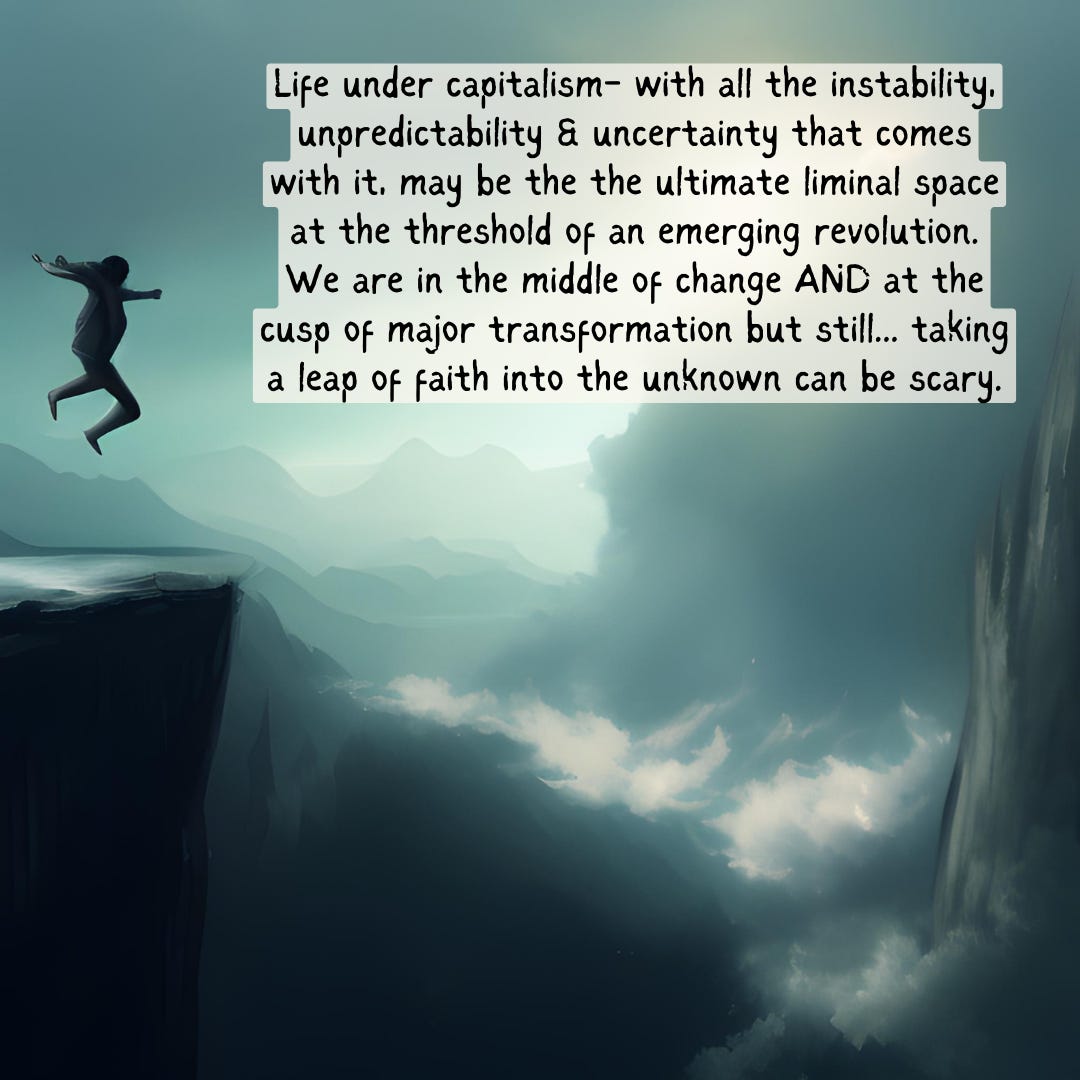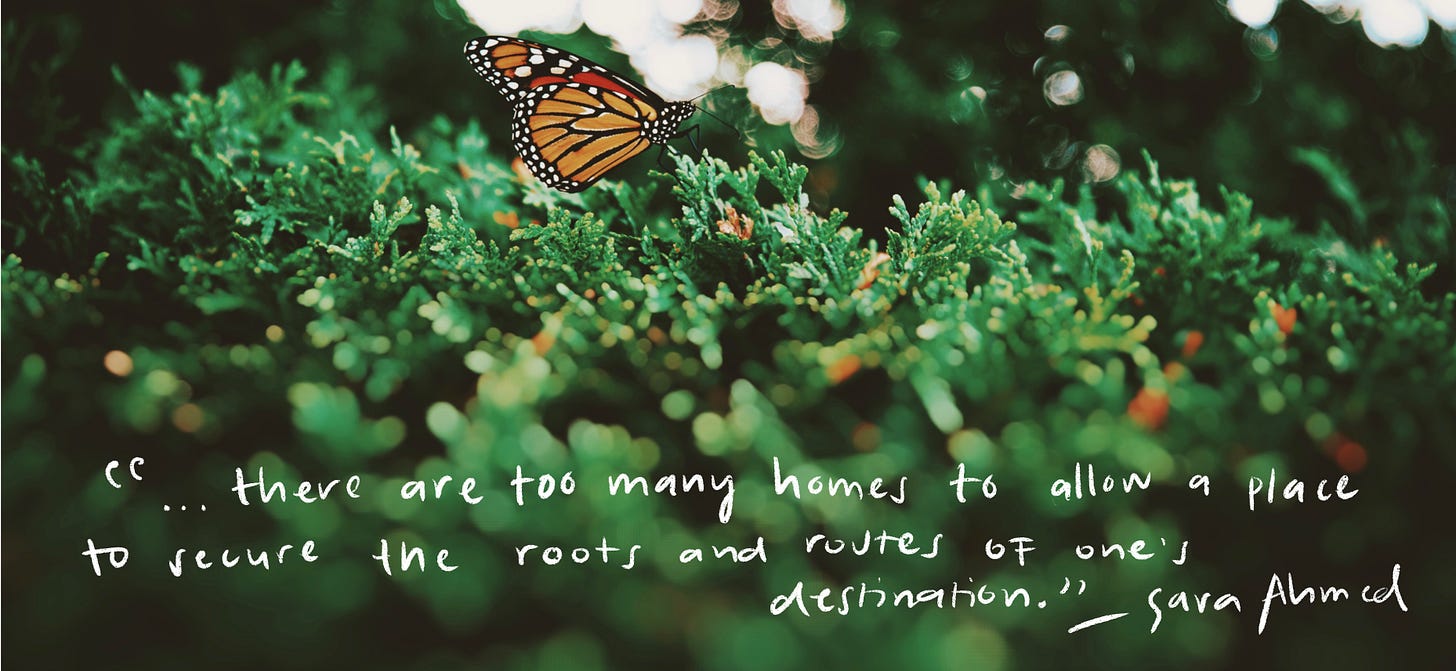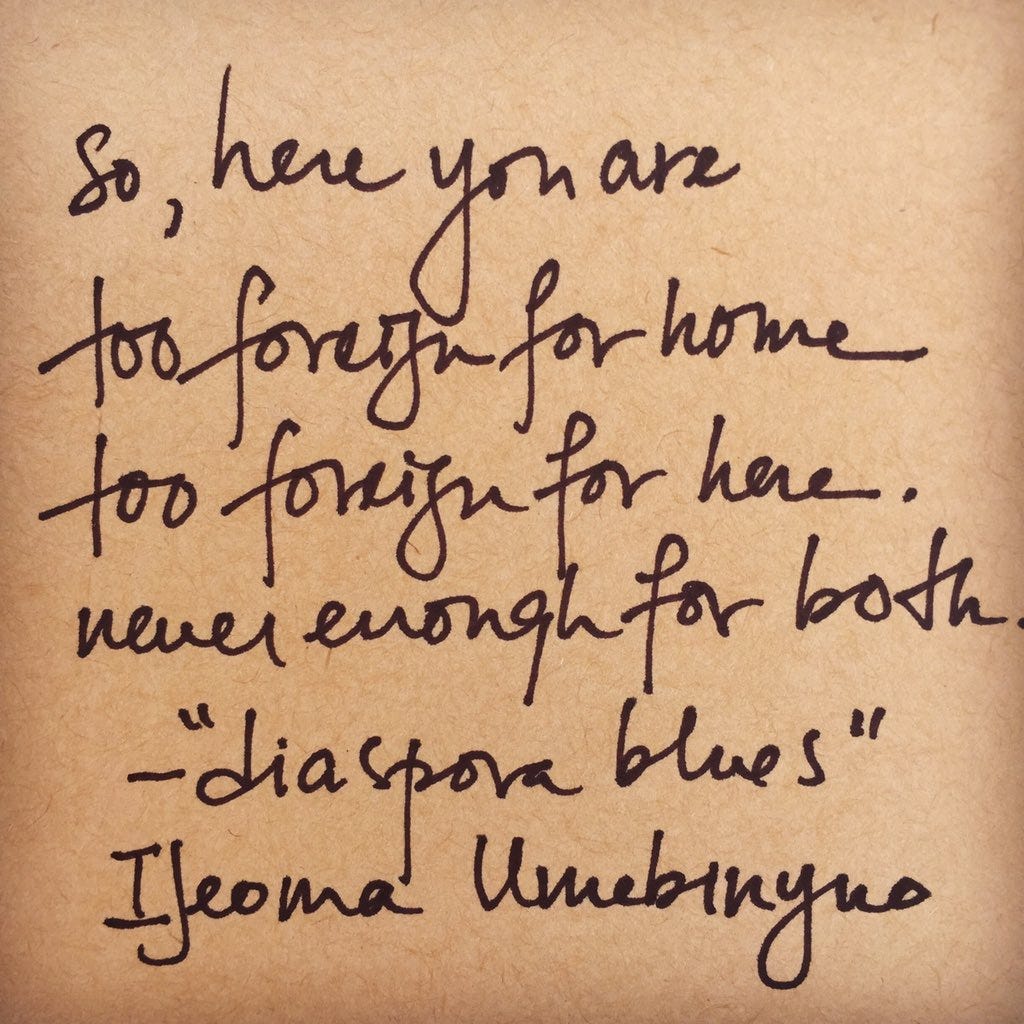Finding home amidst transition: learning from the migration experience
How can we co-create "home" in liminal spaces?
What do we need to truly feel at home? What IS home? Is it a place or something more? Is it the place where we just so happened to be born or something more intentionally co-created?
As migrants who have spent a major part of our lives in the diaspora, we have always had to question words like “home”. Our lives and complex intercontinental journeys have in itself been an ode dedicated to the pursuit of home. When you find yourself in a viscerally foreign place, you are pushed to think deeply about what one needs to be safe, stable, & at home, and very quickly, you realize that it will be a long, difficult but often liberating process, one that you actively have to be a PART OF rather than just hoping to stumble upon a space that immediately feels right. Ultimately, everyone is in search of home and in this piece, we wanted to share some lessons from migration that we believe tell us a lot about the things we need to anchor into to feel safe, secure & heal the wounds inflicted by oppressive systems.
Communities- human, animal, plant or microbial- that have created home amidst oppression, suffering, ever-present stress & unpredictability can teach us a lot about what we need to build together to make each other’s lives more safe and worthy of living.
This a collaborative series by Ayesha & gabes.
gabes is a psychotherapist, community organizer, writer and artist in the Global South (Philippines). Her work and writing focus on the intersection of mental health and collective action. Learn more here.
Ayesha is an anarchist, abolitionist, clinical microbiologist, community organizer, writer, educator, ecologist & land defender from the Global South (South India). Their work focuses on decolonizing medicine and building community care systems that address human & ecosystem health. Learn more here.
Home-
Home is built. Home is not a place defined by a flag, government or the arbitrary borders of a socially constructed nation state. Home is a safety net created by the land beneath you and the people around you with the culture/ traditions/ languages that they carry.
Home can be our natural state of interconnectedness, where we practice reciprocal relationships of giving and receiving, of creating and evolving, and of nurturing and accessing pleasure. But capitalism/ colonialism have distorted our collective sense of home by severing us from the very things that we need to survive: our connection to land & to each other. Most of us no longer live in a collectivist community where we directly provide, care for & sustain each other by stewarding the lands that support us all— instead our survival necessities like food, water, shelter, medicine, art… are all commodified and turned into products that we can only earn the right to “buy” if we sell our labor, our bodies, & minds for profit. These resources are supposed to be naturally stewarded and accessed by particular communities, but are violently invaded and exploited by imperialism — and thus, our sense of home is invaded and exploited.
Even if home is a seemingly simple word we may take for granted, it might be an incredibly complex idea that many of us are all building & feeling while simultaneously seeking & searching. Home may be a constantly shifting, changing, evolving space AND an adaptable, malleable, fluid process AND a dream or hopeful vision. Whatever it is, home is most definitely not a single, stagnant, frozen, immovable, unchangeable, rigid, strictly-defined place that is either lost or found.
Liminal spaces— life under late-stage capitalism
Migrants perpetually exist in liminal spaces— which can be defined as a place of transition, the physical/ emotional/ metaphorical in-between, a temporary state sandwiched between a “before” & “after”, a transient moment in time and yet an indefinite grey zone filled with fear & uncertainty or hopeful anticipation of what is to come. Liminal spaces are the cusp, the threshold at the undefined edge of metamorphosis, the mobile spaces prior to massive change and the passages to transformation. The paradox is that when we are IN these spaces, we may not know what the next phase looks like or when it will come. Does this sound familiar at all? We all move through many liminal spaces- some more personal and some rather collective.
In many ways, this revolution is already here. Still— things may feel particularly bleak in an increasingly unstable, brutal world ravaged with imperialism, state violence, forced displacement, poverty, famine, ecological disasters, pandemics or epidemics, worsening health outcomes, widespread alienation & disconnection and the horrors may feel unrelenting. Many of us are realizing the empire’s promises of future safety, relief & eventual happiness were lies that will not be delivered no matter how much we conform, obey or try to assimilate. All this has led to a growing sense of global dissatisfaction and debilitation where people are often “stuck” in cycles, feeling like they cannot contribute to changing the societal status quo. Sometimes, it all just feels too overwhelming and we’re not sure if/ when this stasis will end.
At the same time, global consciousness is rising- people are awakening, pushing back as they always have, resisting as is inevitable and as all empires fall, this one will too and its demise is impending. We are living in an era of transition. We are so close and yet the indefiniteness of the limbo can drive us to despair and/or hope, and the tension within this in-between space might be new & daunting for some.
Migrants are all too familiar with surviving in liminal spaces because these transitions may be more obvious and “in-your-face”, simply because of the scale of travel with the vast distances that we have to cross. For many refugees that are fleeing the imperial wreckage of their mother-lands, the arduous & often deadly journey across oceans, deserts or barren lands is itself the liminal space. For other migrants who have more access to resources and are seeking better conditions than those that they were born into— the arrival within a foreign country is the marked start of a liminal space filled with uncertainty, grief, terrifying loneliness, desperation, naïve dreams of assimilation and a new-found estrangement from community or detachment from culture.
But- aren’t these feelings, concepts or states of being familiar to all of us in some way? When we begin to redefine the word “migrant”, we realize that we may all resonate with the migration experience in some way, with various nuances & layers of oppression or privilege that play into it, as well as the different yet overlapping experiences. We may also share a collective, deep-seated sense of untethered-ness that gnaws away at us… like we are missing or lacking something crucial that we need to live, something that we can’t quite fully describe maybe and it still feels like a daily, lingering emptiness or a heavy blackhole within us. Home.
At different levels, we’ve known of loss. We are familiar with the grief and the emotional stamina that needed to be stretched from enduring loss. We’ve also known what it’s like to cope with widespread change, which ranges from moving neighborhoods to surviving an ongoing pandemic. No one was exempt from the need to adapt with the global changes and chaos of the latter. Thus, we all share a desperate desire to find grounding amidst the chaos, or anything that will make us feel like we belong to something greater than our individual selves, something that will invigorate us with meaning & purpose… the kind of thing that makes you want to be alive.
Redefining what “migrant” means
There is no universal definition for it but in the mainstream sense, the word “migrant” is associated with a specific type of migration undertaken by a select “type” of people- often racialized folks. Migrants are often defined as people who move between countries or nation states. Migration can be a result of forced displacement due to imminent, overt imperial/ state violence, wars, genocide and colonial occupation like is often the case with communities generally labeled as “refugees”… and/or it can also be a byproduct of long-term, intergenerational colonial conditioning, a more covert normalized violence that comes with the imperial destruction of our mother-lands which can lead to people “deciding” to leave in search of better opportunities and safer conditions elsewhere.
Many of us can resonate with the formative experiences of departure and arrival, needing to move or migrate because of uninhabitable conditions due to systemic oppression. For example: people who move to different cities within the same country for education or in search of job opportunities; and, people that are forcefully displaced from their neighborhood due to gentrification and house inaccessibility. We had to adjust in unfamiliar contexts, weather climates, languages, behaviors, or socio-political conditions. Some of us even started young in treading unknown territory: frequently changing schools, grieving separated or divorced parents, losing loved ones so suddenly, etc.
When we take away borders of a country for a moment, we see that migration is an experience that many can resonate with because colonial/ capitalist systems (represented by a flag, government, political party, company, or institution) have never been a true source of safety, stability, security and care for any of us. Even if we were led to believe that freedom lay under the feet of our oppressors, we’ve always had to look beyond. Deep inside, we’ve always known that home meant something more.
Reclaiming the migrant experience
In identifying our overlapping experiences with migrants, it is important to note that migration is also more than mere struggle. As migrants, we (Ayesha and Gabes) hope to express the multidimensionality of migration beyond suffering.
Every year, monarch butterflies travel southbound beginning autumn. Because they can’t survive the cold in northern climates, these butterflies fly up to 2,500 miles to warmer climates such as Mexico and California. This is an example of how migration doesn't always entail suffering. Finding a second home is a natural phenomenon for monarch butterflies as a species, with the following generations making the trip back to their first home. Evolutionarily, monarch butterflies have longer, elongated wings compared to non-migratory populations. Similarly, when it comes to the human species, migratory populations need to increase their strength and expand their mental faculties in order to survive.
We say this while being careful of over-romanticizing migrants, pedastalizing our bravery and accomplishments to the point of dehumanizing us and capitalizing on our hard work and stories of “making it out alive.” The resilience of migrants is often praised, but we didn’t need to be resilient in the first place. There shouldn’t have to be systemic violence and catastrophes that made us resilient in the first place. We shouldn’t have had to “overcome” such extreme adversity, let alone be pat on the back after as though it is an accomplishment. Most importantly, our struggles are not merely left in the past- we continue to face state violence and are currently being exploited by capitalist, neocolonial systems. The fact that some of us survived the devastation of imperialism isn’t a symbol of our superior intellect or capability relative to others in our community who are perceived as those that “did not make it”.

The over-romanticization of our resilience benefits the white savior complex of needing to “rescue” or provide charity or jobs to vulnerable migratory populations, when migrants’ suffering and tragic conditions were caused by the imperialism of white “saviors” and their ancestors anyway. Moreover, the romanticized sentiments around migrants being agile and efficient is tied to the frameworks of model minority myth and the notion that “im/migrants make America great.” Yes, we are hard-working, but at what cost and for whom? This is an abuse of power by harnessing our stories of resilience to build the foundations of empires in the Global North (North America, Europe, Australia, NZ etc). We can complicate and articulate the experiences of migration by letting us migrants tell and reclaim our stories, not letting others dictate or impose a false monolithic narrative. There’s more to who we are.
Brief introduction to migration thru an ecological lens
Migratory animal, plant and microbial species play a critical role in keeping us all alive. The utility of migration is apparent when we look to the rest of nature. It is not just a survival necessity for the migrating species, but migrants transport nutrients, energy and even other organisms (seeds, symbiotic organisms living in/ on them, microbes etc) between ecosystems which supports the survival of all beings within these ecosystems. Migratory species facilitate a constant influx & efflux of resources and knowledge which is critical in maintaining the biodiversity and overall stability of our ecosystems. Resident species in each ecosystem collaborate and cooperate with migrants to enable their collective survival.
Without migration, our ecosystems would collapse.
Without the consistent relational support and care provided by the resident species within each ecosystem, arriving or departing migrants would not be able to survive and serve their life-sustaining roles. It is all connected. Our survival is entangled and inter-dependent.
Migration is a collective undertaking— whether it is a flock of birds that travel vast distances by navigating celestial and terrestrial magnetic cues TOGETHER; or im/migrant humans who find each other in foreign lands and support each other’s survival by re-creating their homeland’s cultural practices, rituals & traditional meals; or migrant bats who arrive to find abundant sustenance generously offered by the same plants that they helped birth via pollination last migratory season.
In the next pieces, with specific examples and personal anecdotes, we will explore the lessons we can learn about the things we ALL need to survive/ thrive, from understanding human migration through an ecological, collectivist lens.
P.S. We are going to share a video of us in conversation, chatting about these concepts and diving into our personal experiences. We would love to answer some of your questions during our chat! Please drop a comment with any questions you may have (about the piece, about any of our other works etc). We’d love to hear from you <3
The multidimensionality of migration
If not for some of our varying stories of migration, we wouldn’t be able to meet the friends and lovers and strangers who have meaningfully, irreversibly shaped our lives. We grew, struggled, and learned to love and do better because of them. If not for our journeys, we would have missed the chance to fall in love with the many cities and natural landscapes that met our hunger for beauty. With that, we created, formulated, nurtured, and shared beauty as an ongoing result. Im/migrant artists and writers have provided us all with transformative medicine through their poetry, visual art, and fiction. Their stories of migration inspire and haunt us in the most beautiful of ways, making us feel known in our loneliness and longing for home.
Migrants have taken on a vast array of roles and responsibilities for the greater good. They’ve become teachers, human rights defenders, farmers, gardeners, care workers, and agents of change for a better and safer world. Or rather, a better and safer home for all of us. It takes a particular kind of stamina and imagination to co-envision and co-create a better and safer home—a stamina and imagination informed by a longing for home because of the absence or loss of one.
Given the liminal spaces we are in today, may the migrant experience be a teacher of our (r)evolution, imagining and replanting new versions of home, with more freedom, justice, and safety.
Reflective questions:
What have been the migration stories told in your life?
What’s it like to consider migration as more than a one-dimensional thing, that it's more than suffering and pain?
What does mobility look like for you? How have systems of oppressions taken away your resources and sense of home? How have they severed your most formative relationships?
What has mobility taught you in knowing what we need to be free? (i.e., anchoring our security in relationships rather than merely place, etc.)
What have been your ideas and experiences around stability and safety? How can we shift them in light of the migrant experience?
With love and care,
ayesha & gabes.










For me, home is a frequency. Disruptions are constant and so is uncertainty. With land and even culture, I find myself never feeling at home in one place for too long. Maybe it’s because I descend from nomadic people. Maybe it’s because I go through phases as routinely as the moon does. I just know that home is wherever I feel sovereign. Where the energy I’m surrounded by is nurturing and empowering and curious about what I have to offer. The frequency of sovereignty, love, empowerment, & curiosity is where I work to reside, no matter where I happen to physically be.
I’ve been struggling a lot with migration lately. As an urban ecologist by day, I can see the wounds of the world that come with the disconnection/distance from homelands and the species therein, unfamiliarity with the new land and the beings we encounter, and how long it really takes to get to know and learn how care of the new space (esp since ecologically, those spaces shift rapidly too). Especially as capitalist systems continue to require us to work to live and keeps most people too busy to learn the land. The constant transition is a struggle for me atm, so hoping for a reframe while reading the coming posts on your reflections!